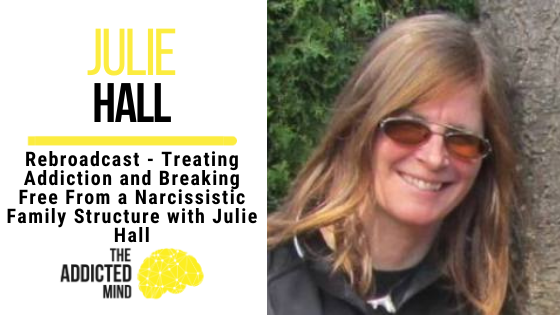Everyone has a level of healthy narcissism. We all see things through our lens to some degree. The narcissist, however, has pathological levels of self-involvement and he or she experiences fundamental developmental deficits early on in life.
According to author and speaker, Julie Hall, addiction is a huge part of the narcissistic family system. There is a pattern of depression, anger, confusion with family rifts, and alienation, and there is no awareness of what the core issue is.
In her book, The Narcissist In Your Life: Recognizing the Patterns and Learning to Break Free, Julie breaks down the pattern of a narcissistic personality disorder.
Narcissism vs. Narcissistic Personality Disorder
Everyone has a level of healthy narcissism. We all see things through our lens to some degree. The narcissist, however, has pathological levels of self-involvement and he or she experiences fundamental developmental deficits early on in life.
With narcissists, there’s an underlying sense of profound vulnerability, shame, inferiority, and worthlessness.
Narcissism is a defensive coping structure and children who develop this kind of coping structure tend to repress their feelings of vulnerability and shame. They build an exterior persona to mask their overwhelming feelings.
They develop a false grandiose and superior personality, often becoming domineering and competitive. They are out of touch with their inner, emotional world and so they don’t actively engage with people on an emotional level.
The narcissistic personality avoids self-reflection at all costs and it learns to mimic certain behaviors that look like intimacy.
Narcissists tend to see themselves and others as either worthless or wonderful. When they see themselves (or others) as perfect, they need to stay that way in order not to feel worthless. They seem to be in a state that is disconnected from other people.
The Narcissistic Family and Its Role in Addiction
In a family in which one or both of the parents are narcissistic, the family is structured in such a way that the needs of the children are secondary to the needs of the parents. Several dysfunctional families are set up that way. But there are differences unique to a narcissistic family as opposed to an alcoholic family or an addicted family.
Addiction is a huge part of this whole narcissistic family system. People coming out of families like this are dysregulated themselves, and they are carrying complex trauma. There’s a pattern of depression, anger, confusion, family rifts, and alienation.
It manifests in many ways, whether it’s substance abuse, sex addiction, eating disorders, or any kind of addiction. There’s a loss of homeostasis when you’re in that traumatizing environment. And so, you try to find a way to cope with all of the confusion.
If you want to learn more about how a narcissistic family structure plays a role in addiction, check out https://theaddictedmind.
Follow and Review: We’d love it even more if you could drop a review or 5-star rating over on Apple Podcasts. Simply select “Ratings and Reviews” and “Write a Review” then a quick line with your favorite part of the episode. It only takes a second and it helps spread the word about the podcast.
Supporting Resources:
If you live in California and are looking for counseling or therapy please check out Novus Mindful Life Counseling and Recovery Center
We want to hear from you. Leave us a message or ask us a question: https://www.speakpipe.com/addictedmind

